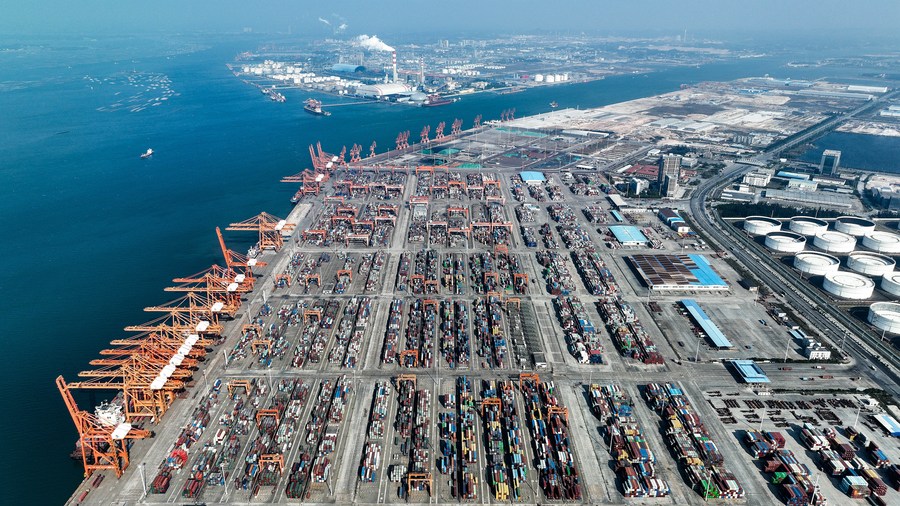

With exports hitting a new high and total foreign trade generally stable, China’s foreign trade market has had a stable start despite lingering high inflation and weakening economic and trade growth globally.
Data from the General Administration of Customs (GAC) showed Tuesday that the country’s exports of goods rose 0.9 percent year on year during the first two months to 3.5 trillion yuan (about 506.10 billion U.S. dollars).
China’s foreign trade of goods edged down 0.8 percent year on year to 6.18 trillion yuan in the period. The imports of goods stood at 2.68 trillion yuan in the same period, down 2.9 percent from the same period last year.
The country’s trade surplus hit 810.32 billion yuan in the period, jumping 16.2 percent year on year, the data showed.
China’s foreign trade has braved the challenges of multiple factors, such as weakening external demand and last year’s high base, and continued to support the country’s economic growth, said Lyu Daliang, an official with the GAC.
In the Jan.-Feb. period, the Association of Southeast Asian Nations (ASEAN) remained China’s largest trade partner. China’s trade with ASEAN countries rose 9.6 percent year on year to 951.93 billion yuan, accounting for 15.4 percent of the country’s total.
China’s trade with countries along the Belt and Road climbed 10.1 percent year on year to 2.12 trillion yuan, driving the overall growth of its imports and exports by 3.1 percentage points in the first two months.
The country’s trade with other members of the Regional Comprehensive Economic Partnership rose 3.1 percent during the same period.
Private enterprises made positive contributions to stabilizing the scale and optimizing the structure of China’s foreign trade. In the Jan.-Feb. period, the imports and exports of these enterprises went up 5.3 percent year on year to 3.16 trillion yuan, accounting for 51.2 percent of the country’s total.
In the first two months, the imports and exports of China’s central and western regions surged 12.1 percent year on year, accounting for 19.2 percent of the country’s total, the data also showed.
Automobile exports in these regions doubled year on year in the period, and the expansion of mobile phone and agricultural product exports both exceeded 20 percent.
China has pledged to adopt a package of steps to stabilize foreign trade, including helping foreign trade enterprises receive orders and maintain production, accelerating the development of new forms and models of foreign trade, giving full play to the role of cross-border e-commerce, and supporting the establishment of a number of overseas warehouses.
It has also vowed to actively increase imports of quality products and services and explore new ways to develop trade in services and digital trade.
Since the beginning of February, China’s foreign trade has seen overall improvements, said Lyu, stressing the significant growth in late February. The positive momentum is expected to continue according to relative indicators, Lyu added.